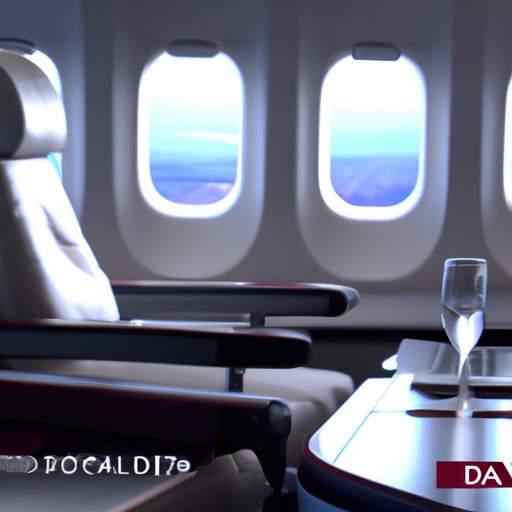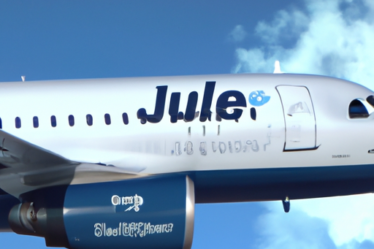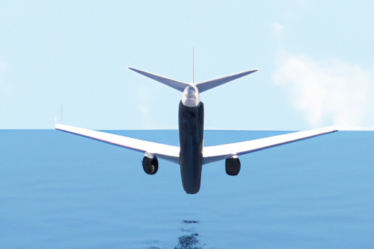
The Impact of Delta’s First Class Seat Sales Increase on Revenue and Profitability
Delta Airlines has made a significant move to increase its first class seat sales, with the percentage rising from a mere 14% in 2011 to an impressive 74% in recent years. This shift in strategy has had a profound impact on the airline’s revenue and profitability, and it is worth exploring the reasons behind this decision and the benefits it has brought to Delta.
One of the main reasons for Delta’s decision to increase first class seat sales is the growing demand for premium travel experiences. As more and more travelers seek comfort and luxury during their flights, Delta recognized the opportunity to cater to this market segment. By offering a higher percentage of first class seats, the airline is able to meet the needs and preferences of these discerning customers.
Furthermore, the increase in first class seat sales has had a positive effect on Delta’s revenue. First class tickets are typically priced at a premium, allowing the airline to generate higher ticket sales and increase its overall revenue. This additional revenue stream has undoubtedly contributed to Delta’s financial success and profitability.
In addition to the financial benefits, the increase in first class seat sales has also improved Delta’s reputation and customer satisfaction. By offering a larger number of first class seats, the airline is able to provide a more personalized and exclusive experience to its passengers. This has resulted in higher customer satisfaction levels and increased loyalty among Delta’s premium travelers.
Moreover, the increase in first class seat sales has allowed Delta to differentiate itself from its competitors. In an industry where airlines often compete on price and routes, Delta has managed to stand out by offering a superior travel experience. This has helped the airline attract new customers and retain existing ones, further contributing to its overall success.
It is important to note that Delta’s decision to increase first class seat sales has not come without challenges. One of the main challenges is the need to balance the demand for first class seats with the availability of such seats on each flight. Delta has had to carefully manage its inventory to ensure that it can meet the demand for first class travel without compromising on the overall passenger experience.
To address this challenge, Delta has implemented a dynamic pricing strategy for its first class seats. By adjusting the prices based on demand and availability, the airline is able to maximize its revenue while ensuring that its premium customers have access to the desired level of service.
In conclusion, Delta’s decision to increase first class seat sales has had a significant impact on its revenue and profitability. By recognizing the growing demand for premium travel experiences and catering to this market segment, Delta has been able to generate higher ticket sales and increase its overall revenue. Additionally, the increase in first class seat sales has improved Delta’s reputation, customer satisfaction, and loyalty. While there are challenges associated with managing the demand for first class seats, Delta has successfully navigated these challenges through a dynamic pricing strategy. Overall, the increase in first class seat sales has proven to be a successful strategy for Delta, positioning the airline as a leader in the premium travel market.
Analyzing the Factors Behind Delta’s Successful First Class Seat Sales Growth

Delta Airlines has experienced a significant increase in first class seat sales over the past decade. In 2011, only 14% of Delta’s total seat sales were for first class, but that number has now skyrocketed to an impressive 74%. This remarkable growth begs the question: what factors have contributed to Delta’s success in selling more first class seats?
One key factor behind Delta’s successful first class seat sales growth is the airline’s commitment to providing exceptional customer service. Delta has made it a priority to ensure that passengers in first class receive a premium experience from the moment they step foot on the plane. From dedicated check-in counters to priority boarding and baggage handling, Delta goes above and beyond to make first class passengers feel valued and pampered.
Another factor that has played a significant role in Delta’s first class seat sales growth is the airline’s investment in upgrading its first class cabins. Delta has made substantial improvements to its first class seats, offering more legroom, wider seats, and enhanced comfort features. These upgrades have made the first class experience on Delta more appealing to passengers, leading to increased demand for these premium seats.
In addition to providing exceptional customer service and upgrading its first class cabins, Delta has also implemented a strategic pricing strategy to boost first class seat sales. The airline has introduced various fare classes within first class, allowing passengers to choose the level of luxury and amenities that best suit their needs and budget. By offering different price points, Delta has made first class more accessible to a wider range of travelers, attracting more customers and driving up seat sales.
Furthermore, Delta has been successful in leveraging its frequent flyer program to increase first class seat sales. The airline offers elite status to its most loyal customers, granting them access to exclusive benefits such as complimentary upgrades to first class. This incentive has not only encouraged passengers to choose Delta over its competitors but has also created a sense of loyalty and reward, further driving up first class seat sales.
Delta’s successful marketing and advertising campaigns have also played a significant role in the airline’s first class seat sales growth. The airline has effectively promoted the benefits and features of its first class cabins, enticing passengers to upgrade their travel experience. Through targeted advertisements and partnerships with luxury brands, Delta has successfully positioned its first class as a desirable and aspirational product, further fueling demand for these premium seats.
Lastly, Delta’s focus on expanding its route network and increasing its flight frequencies has contributed to the growth in first class seat sales. By offering more flights and destinations, Delta has been able to capture a larger market share and attract a broader range of passengers. This increased demand for Delta’s services has naturally translated into higher first class seat sales.
In conclusion, Delta’s remarkable increase in first class seat sales can be attributed to a combination of factors. The airline’s commitment to exceptional customer service, investment in upgrading its first class cabins, strategic pricing, leveraging its frequent flyer program, effective marketing campaigns, and expansion of its route network have all played a significant role in driving up demand for first class seats. As Delta continues to prioritize the needs and preferences of its passengers, it is likely that the airline will see further growth in its first class seat sales in the years to come.
Exploring Customer Preferences and Market Trends in Delta’s First Class Seat Sales Surge
Delta Airlines has seen a significant increase in the sales of its first-class seats over the past decade. In 2011, only 14% of Delta’s seat sales were for first class, but that number has now skyrocketed to an impressive 74%. This surge in first-class seat sales has prompted many to wonder what factors have contributed to this shift in customer preferences and market trends.
One possible explanation for this increase in first-class seat sales is the changing demographics of Delta’s customer base. Over the past decade, there has been a noticeable increase in the number of high-income individuals who are choosing to fly with Delta. These individuals are often willing to pay a premium for the added comfort and luxury that first-class seats provide. As a result, Delta has responded by increasing the availability of first-class seats on its flights to meet this growing demand.
Another factor that may have contributed to the surge in first-class seat sales is the overall improvement in the economy. As the economy has rebounded from the recession of 2008, more people have disposable income to spend on luxury items, such as first-class air travel. Delta has recognized this trend and has strategically positioned itself to cater to this market segment by offering more first-class seats on its flights.
In addition to changing demographics and an improved economy, Delta has also made significant efforts to enhance the overall customer experience in first class. The airline has invested in upgrading its first-class cabins, offering larger and more comfortable seats, as well as improved amenities such as gourmet meals and personalized service. These enhancements have undoubtedly played a role in attracting more customers to choose first class over economy or business class.
Furthermore, Delta has implemented various marketing strategies to promote its first-class offerings. The airline has launched targeted advertising campaigns that highlight the benefits of flying first class, such as priority boarding, access to exclusive lounges, and extra legroom. By effectively communicating these advantages to potential customers, Delta has successfully increased awareness and interest in its first-class product.
It is also worth noting that Delta’s competitors have also experienced a similar increase in first-class seat sales. This suggests that the surge in demand for first-class travel is not unique to Delta but rather reflects a broader trend in the airline industry. As more airlines recognize the profitability of catering to high-end customers, they too are investing in upgrading their first-class offerings and increasing the availability of first-class seats.
In conclusion, Delta’s significant increase in first-class seat sales from 14% in 2011 to 74% today can be attributed to a combination of factors. Changing demographics, an improved economy, enhanced customer experience, effective marketing strategies, and industry-wide trends have all played a role in driving this surge in demand for first-class travel. As Delta continues to adapt to evolving customer preferences and market trends, it is likely that the popularity of its first-class product will continue to grow.


